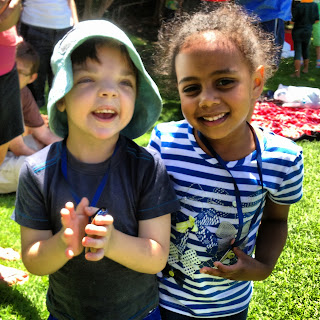This last week Matt has had some wonderfully positive play-encounters with children who were comfortable around him, and in contrast, let's call it a disconnected play-encounter, where the children were awkward and unsure how to engage with Matt. Now that I've worked through the emotional ache of seeing Matt not belonging, it got me thinking about how we, as parents, can best equip our kids to connect with children who are different to them.
We’ve all seen those inspiring and tear-jerking videos that do the rounds
on social media. The one with the child who has a disability and is coming last in the race, but is running his heart out, and his courage and determination
draws out fellow pupils to run alongside and cheer him on. (Seriously, watch it if you haven't) Something of this
really connects with us, we are moved, it is just so emotional. Why?
Is it that we all fear being the outcast? Our society
honours those who fit in with the latest trends, things and thinking. We know
what society does to the outcast – the unenviable reward of loneliness and aloneness.
In these videos we see children rebelling against this societal reward system
and they choose to cheer for the one who is coming last, the one who is not deemed
hot and happening by society’s standards.
And something in us cheers them on.
Is it our longing that we too would be cheered on instead of
judged when we are functioning at our weakest and worst; that we would be
accepted when we let our masks down and show the world who we really are; that
we would be embraced and belong because we are human, not because we fit a
certain image?
Is it our longing that we would be like those young people
who throw off the standards of society of what is cool and comfortable,
choosing a different way of engaging?
And those of us who have kids of our own hope that our
children will choose this way if they were ever in the situation...
That they would embrace rather than reject. That they would walk with humility rather than superiority.
That their hearts would be open not closed to those who are different to them.
That they would delight in diversity and not fear it.
I have come to realise that this much-desired goal does not
just happen. Just as our physical muscles need training and exercise to run
fast and far, so our social muscles need training and exercise to feel comfortable
to embrace those who are different to us.
It is not just going happen.
Telling our kids to be nice to all people is not enough. Telling
our kids they must play with everyone is not enough. Just like telling a child that she must run fast in the race is not going to give her the ability to physically move her
body at speed.
So what training is required to be able to delight in
diversity? Here are a few ideas:
1. Placing our kids amongst those who are different to them.
Actually doing it. Being in schools and churches and playgrounds where there
are kids from different genders, abilities, races, ethnicities, class back
grounds, religions, etc. You get the picture. How can they possibly strengthen those diversity muscles if all their friends are all the same as them?
2. Helping our kids make sense of this diversity thing. Chatting it through with our kids about what it is like playing with someone who is different. What is hard? What is interesting? What have they learnt? What is cool? What is scary? What new thing can we do at home?
3. Working out our family values that can build those diversity
muscles. How about some of these values?
- We cheer on each other for the unique way God’s designed us. It is never acceptable to belittle anyone for being different.
- Mistakes are cool, cos we learn from them. So we don’t tease if someone fails.
- Kindness, kindness, kindness.
- Empathy – what do you think that person is feeling?
- It’s fun that we are not all the same – you can like pasta
and he can like fish fingers
4. But here’s the most crucial training exercise for our
children, the one that the other training exercises all depend upon. It is the
deal breaker.
It is this: that we, as parents, place ourselves in settings
where we engage with diverse people; that we have friends who are different to us.
We cannot authentically train our kids to buck the societal system that rewards
sameness if we are succumbing to this system in our own lives. As with most
life skills, our kids are going to learn more from us about how to delight in diversity
by watching us as we do it. Even if we don’t get it right all the time, even if
it is uncomfortable sometimes, even if it takes more energy than we feel we have,
this is how they learn. I make it sound like diversity is drudgery, but the
reality is that doing diverse friendships is actually more rewarding than it is
hard work. How better to motivate our kids to step through their fear than
seeing us shining with the joy of being free from the “safeness in sameness”
mentality.
Delighting in diversity - what a meaningful
gift to give our kids…
to live life free from fear of those different to them
to still be confident when they are not surrounded by others
who are the same as them
to experience the joy, yes joy, of swimming upstream against
society’s values of who has worth and who has none
to break the power of prejudice
and to be part of changing the world








































